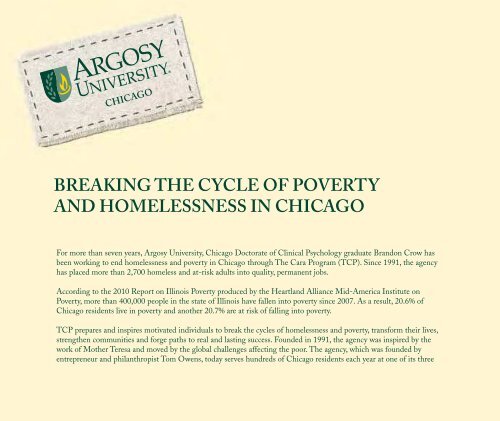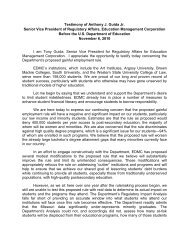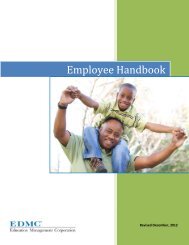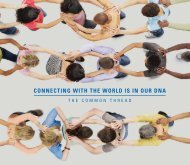here - Education Management Corporation
here - Education Management Corporation
here - Education Management Corporation
You also want an ePaper? Increase the reach of your titles
YUMPU automatically turns print PDFs into web optimized ePapers that Google loves.
Chicago<br />
Breaking the Cycle of Poverty<br />
and Homelessness in Chicago<br />
For more than seven years, Argosy University, Chicago Doctorate of Clinical Psychology graduate Brandon Crow has<br />
been working to end homelessness and poverty in Chicago through The Cara Program (TCP). Since 1991, the agency<br />
has placed more than 2,700 homeless and at-risk adults into quality, permanent jobs.<br />
According to the 2010 Report on Illinois Poverty produced by the Heartland Alliance Mid-America Institute on<br />
Poverty, more than 400,000 people in the state of Illinois have fallen into poverty since 2007. As a result, 20.6% of<br />
Chicago residents live in poverty and another 20.7% are at risk of falling into poverty.<br />
TCP prepares and inspires motivated individuals to break the cycles of homelessness and poverty, transform their lives,<br />
strengthen communities and forge paths to real and lasting success. Founded in 1991, the agency was inspired by the<br />
work of Mother Teresa and moved by the global challenges affecting the poor. The agency, which was founded by<br />
entrepreneur and philanthropist Tom Owens, today serves hundreds of Chicago residents each year at one of its three<br />
facilities – a main training center and two community centers<br />
In addition, the agency has two social enterprises, Cleanslate<br />
Neighborhood Beautification Services and 180 o Properties (a joint<br />
venture with Mercy Housing Lakefront), which serve as a property<br />
preservation business for homes in foreclosure.<br />
Crow, now the vice president of programs for the agency, is a<br />
member of the senior management team, working on traditional<br />
programs that service the community. Those programs include<br />
admissions, job and life skills training, job placement, supportive<br />
services and clinical services. “I am fortunate to have had professors<br />
and training supervisors who helped me develop the skills that I use<br />
in direct service and in managing and training others. With this, we<br />
are able to provide Chicago’s homeless and at-risk population with<br />
the best possible support and services that put them on the road to<br />
self-sufficiency,” said Crow.<br />
After one year of employment, 75% of those who had enrolled in<br />
TCP remained in their initial jobs and more than 82% lived in<br />
permanent housing – a radical improvement from the 19% that had<br />
permanent housing when they entered the program. “Being a part of<br />
literally seeing the end of the cycle of poverty for an individual and<br />
his or her family has, and always will be, the high point of my work<br />
<strong>here</strong>,” said Crow.<br />
According to the agency, “The goal of TCP is not simply to see each<br />
student gain quality employment, secure permanent housing and<br />
establish sustainable financial habits. It is to know that they have<br />
built a solid foundation for the future and that they are setting and<br />
achieving goals. We want our graduates to have the self-knowledge,<br />
the inner strength and the practical skills that they need to create<br />
lasting success and lift themselves and their families out of poverty.”









